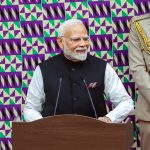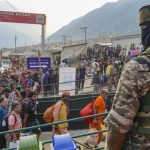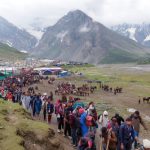The G20 summit in Kashmir is yet another path-breaking move of Prime Minister Narendra Modi-led government to take Jammu and Kashmir to new heights.
Srinagar hosting the maiden international summit after the revocation of Article 370, a temporary provision in the Constitution, has rekindled the hopes for a better and secure future for the Himalayan region. For 30-long years, the people of Kashmir lived under the shadow of guns and bombs that were sent by Pakistan to keep J-K burning.
Agents of the neighbouring country present in Kashmir, sponsored street protests, stone-pelting and shutdowns to disrupt the normal lives of the people. They were paid by their masters sitting across the Line of Control (LoC) to create chaos, confusion and uncertainty.
Till August 5, 2019–when the Centre announced its decision to scrap J-K’s special status and bifurcated it into two Union Territories–no one in Kashmir had even thought that J-K’s summer capital would host the representatives from the 20 most powerful countries in the world and Srinagar would figure in the list of global cities.
However, during the past more than three years the Union Territory has traversed a long way from instability to stability, disturbances to humming economic activity and alien stone-throwing culture to renaissance of the rich heritage and culture.
The determination of the people has bid farewell to a nightmarish phase of disruptions, violence and bloodshed.
Now, the scenario has changed with tourists thronging Kashmir to have their best of times. Nearly 1.88 crore tourists visiting J-K in 2022 have broken all previous records.
Relentless efforts put in by Prime Minister Modi and Union Home Minister Amit Shah have pulled J-K out of the quagmire of uncertainty and have put it on the path of peace, prosperity and development.
The enthusiasm shown by the people of Jammu and Kashmir about the G20 event in Srinagar signifies the change that the Union Territory has witnessed after 2019.
People are reaping the dividends of peace in terms of a big boom in economic activity and near normalcy leading to a smooth way of life.
Space for the anti-peace elements has shrunk. Nefarious designs of the obstructionists to push J-K into an era of despair and hopelessness again have been thwarted.
Common man in J-K has welcomed the Centre’s move to hold the third meeting of the G20 Tourism Working Group in Srinagar. They have understood the need to sustain the prevailing era of peace and harmony for making his life easy and happy.
Huge investments that J-K has received after 2019 have opened up new employment avenues and people have started prospering.
The G20 event in Srinagar has put J-K on a larger canvas globally. This is set to give a fillip to global investments for industrialization and infrastructural development. The beginning has already been made due to concerted efforts put in by the Centre and the UT administration.
Public participation in governance and inclusive development have instilled a sense of confidence among the J-K people, who are looking for the momentum to continue for the betterment of their region.
Pertinently, Kashmir-based politicians, who ruled J-K from 1947 to 2018, had created a notion that peace cannot return to the Himalayan region without holding talks with Pakistan and the terrorists sponsored by it.
Rather than looking towards New Delhi to end the violence in the region, they were more inclined towards seeking Islamabad’s help to restore peace in J-K.
For them “Kashmir was an issue” which needed to be resolved through tripartite or trilateral talks between India, Pakistan and the representatives of J-K people.
It’s an open secret that J-K for seven long decades remained deprived of the benefits of the centrally sponsored schemes due to the wrong policies followed by the former political regimes in the region.
Till Narendra Modi took over as the Prime Minister of India in 2014, the political regimes in J-K allowed the separatists and the terrorists sponsored by Pakistan to call the shots and run a parallel system.
Politicians remained busy pursuing the separatists to initiate dialogue with the Centre and stop sponsoring the violence. They couldn’t muster the courage to call spade a spade and speak the truth that J-K is an integral part of India and it’s no “dispute.”
PM Modi-led dispensation during the past nine years has made it clear to the world and its adversaries that Jammu and Kashmir is an integral part of India and its citizens are no different from the people of other parts of the country.
By holding the all-important G20 Tourism Working Group meeting in Srinagar the Centre has driven home a point that the summer capital of J-K is like any other city in the country.
The G20 countries by sending their representatives to Kashmir have endorsed India’s stand. No country barring China and Turkey, close allies of Pakistan, has paid any attention towards the objections raised by India’s neighbour to hold the G20 summit in Kashmir.
Srinagar has welcomed the international delegates with open arms. It’s for the first time after 1990 that no strike has been called to oppose the visit of the international delegates to Srinagar.
For 30 years, strikes were a part and parcel of the lives of common people in Kashmir as Pakistan stooges used shutdown as a tool to appease their bosses sitting across the LoC.
As of date no separatist is relevant in Kashmir, neither are the people paying any attention to them.
J-K witnessing unprecedented development post-August 5, 2019 has opened the eyes of the common man. They have understood the difference between good and evil.
More than anyone else the common people of J-K are aware of the fact that the G20 being held in their land is an honour and it has provided them with an opportunity to showcase their culture, hospitality and tourism to the world. (ANI)








